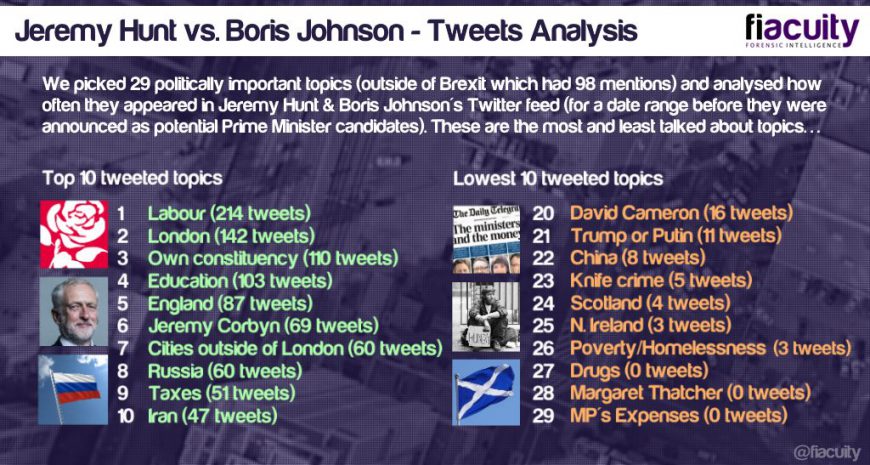The position for our next Prime Minister will be decided on Monday 22nd July by Conservative party members nationwide. In recent weeks there has been substantial press coverage of the final two contenders – Boris Johnson MP and Jeremy Hunt MP. Both men have a high media profile due to past appointments and both have contrasting styles.
Whilst much has been made of their previous policies, character and in particular, views on Brexit, little has been said regarding their past comments on Social Media. With this in mind, our digital intelligence analysts have analysed both candidates full Twitter history dating from 20th May 2010 to 12th February 2019 in order to better understand – “what does our potential future Prime Minister actually tweet about?”.
Key Highlights
- Boris Johnson has mentioned the UK’s largest cities (by population – Leeds, Manchester, Liverpool, Birmingham, Glasgow, Newcastle, Sheffield, Sunderland and Bristol) just twice compared to his 68 mentions for London.
- Scotland is mentioned just 4 times by Jeremy Hunt and 0 by Boris Johnson. Wales is never mentioned in any of Boris Johnson’s tweets. Though in the last few weeks (since the campaigning for PM) we have seen a significant increase in discussion about Northern cities/regions and Scotland, Wales & Northern Ireland.
- England accounts for 70% of all tweets regarding nations in the United Kingdom by both MPs.
- There are just 3 tweets concerning poverty, homelessness or unemployment from both candidates combined. Tweets relating to “taxes” feature 30 times for Hunt and 21 times for Johnson.
- Boris Johnson mentioned Russia, North Korea and Iran consistently, though this reflects his former position as Foreign Secretary.
- Neither candidate discusses illegal drug usage, policy or prevention.
- Boris Johnson name-checked Jeremy Corbyn 55 times – more than Theresa May and David Cameron combined.
- Boris Johnson’s most talked about topic is in reference to his constituency.
- Neither candidate has ever tweeted about MP expenses.
- Brexit was mentioned just 98 times in total.
- Johnson has never had a direct 1-2-1 conversation with anyone on Twitter and tends to broadcast content about himself. Boris Johnson talks about himself 8.8x more than other people whilst Jeremy Hunt talks about himself 4.1x more.
What we’ve been looking at
Our team decided upon a number of key talking points and issues that have proved to have be important in the last few years. Below is a table outlining the frequency of phrases or keywords related to that topic for each candidate.
The tweets are taken from the date range (20th May 2010 to 12th February 2019) before their candidacy was announced and are based on 1,420 for @BorisJohnson and 2,783 tweets for @Jeremy_Hunt – retweets have been removed from the data.

Small print: Where appropriate we have accounted for misspellings, abbreviations, initialisms and alternative ways of referring to the issue. Where there are too many alternative references these have been combined into a topic.
Analysis broken down by topic area
Cities
- Both mention London 65+ times on their social media.
- Leeds, Manchester, Liverpool, Birmingham, Glasgow, Newcastle, Sheffield, Sunderland & Bristol are mentioned 60 times in total, but mainly by Jeremy Hunt (who is usually referencing a medical facility as part of his job as Heath Secretary).
- Boris Johnson never mentioned Leeds, Manchester, Liverpool, Glasgow, Newcastle, Sheffield or Sunderland.
Countries
- Boris Johnson has never mentioned Scotland or Wales in 1,420 tweets.
- Hunt has mentioned England 85 times and Wales 30 times. Scotland only 4 and Northern Ireland only once.
- Countries in the union are mentioned 124 times, therefore England is mentioned 70.2%, Scotland 3.2%, Wales – 24.2% and Northern Ireland – 2.4%.
- Boris Johnson has mentioned Syria 83 times but there is only one mention of ‘Syrian refugees’.
Poverty
- Keywords ‘poverty’, ‘homeless’ and ‘food banks’ are rarely mentioned.
- Boris Johnson – discussed ‘poverty’ once in 1,420 tweets.
- Jeremy Hunt has never mentioned food banks, homelessness or poverty but has mentioned unemployment twice in 2,783 tweets.
Labour
- Boris Johnson has mentioned Labour 35 times.
- Jeremy Hunt has mentioned Labour 179 times.
- Boris Johnson has mentioned Ed “Miliband” 16 times and current Labour leader Jeremy “Corbyn” 55 times
- Jeremey Hunt mentioned Ed “Miliband” 32 times and Jeremy “Corbyn” 14 times
Prime Ministers
- Boris Johnson has used the terms ‘PM’ and ‘Prime Minister’ 38 times
- Jeremy Hunt has used these phrases 56 times.
- References to the Prime Minister (David Cameron or Theresa May) were most prevalent in 2015 and 2017 (both election years).
- Jeremy Hunt speaks about Cameron – 51 times, and May – 19 times.
- Boris Johnson mentions Cameron – 13 times and May 50.
Other Political Parties
- UKIP has 7 mentions overall across these tweets
- Lib Dems are mentioned just once.
- Labour have 214 mentions combined from both candidates with Jeremy Hunt accounting for 83.6% of these tweets.
What about Brexit?
We made a decision to not include stats about Brexit based on a few factors:
- Both candidates have stated they want Brexit to happen, so we felt it would be more interesting to look at their policies and how they would shape the country post-Brexit
- We also felt that Brexit inevitably would be the most talked-about topic. That being said… Brexit is inescapable from the media but not as mentioned by the two candidates as much as you would expect.
Hunt mentioned Brexit just 25 times whilst Johnson mentioned it 73 times during our sample range. This isn’t much of a surprise considering Johnson’s leading role in the Leave campaign.
However, it is surprising that Brexit wasn’t the most discussed topic for the tweets analysed. Instead, content was clearly more focused on criticism of Labour, London-centric and in relation to their own constituencies.
So what do they talk about?
To get a better understanding of their favourite topics outside of politics we’ve collated all of the candidates tweets and visualised them into a word cloud. The larger the word, the more prominently it features in their tweets:
Jeremy Hunt
Unsurprisingly, Hunt’s most discussed topic is regarding the NHS, an institution that he oversaw as Health Secretary for just under 6 years. Associated words such as “health”, “care”, “staff” and “patients” all feature heavily.
Much of Hunt’s tweets are positively focussed, which is expressed through usage of language like “forward”, “great”, “can”, “good”, “thanks” and “brilliant”. This positive language is often applied to his initiatives within the NHS and arguably to counter criticism faced regarding cuts to the NHS during his tenure.
Hunt directly replies or opens conversation with other users 264 times from 2,783 tweets (9% of all tweets), with most of his content being statements broadcasted to his followers. Mayor of Manchester, Andy Burnham, is who he tweeted to the most in direct conversation.
Boris Johnson
Like Hunt, Johnson’s content is reflective of his cabinet position as Foreign Secrerary. Language such as “Syria”, “Russia”, “nato”, “Yemen” “security”, “trade” and “Brexit” are substantially more discussed than domestic issues.
Language such as “Syria”, “Russia”, “nato”, “Yemen” “security”, “trade” and “Brexit” are substantially more discussed than domestic issues.
Like Hunt, there is a common frequency for positivity in his content with “delighted”, “fantastic”, “great”, “forward” and “together” featuring heavily.
Interestingly, Johnson does not use Twitter to have direct conversations with users. 100% of his tweets analysed are broadcast tweets – meaning he never replies to users or opens up direct 1-2-1 conversation with individuals.
How easy are their tweets to read?
We also analysed the tweets to determine a Flesch-Kincaid Grade Level. The Flesch-Kincaid grade was famously used by the US Navy to determine the readability of language to indicate how difficult certain text in English is to understand. This also provides us with an estimated reading age required in order to understand the tweets.
To provide an idea of scoring, it is recommended to aim for a score of 8.
| Jeremy Hunt | Boris Johnson | |
| Tweets | 2,783 | 1,420 |
| Flesch-Kincaid Grade Level | 7.3 | 7.7 |
| Reading Age Required | 12.3 | 12.7 |
| Words | 61,523 | 35,753 |
| Words per sentence | 9.79 | 7.47 |
| Syllables per word | 1.62 | 1.73 |
| You/Me Ratio | Talked about himself 4.1 x than others | Talked about himself 8.8 x than others |
Both politicians are slightly below the recommended grade level score of 8, though Boris Johnson is closer. Whilst Hunt uses longer sentences, Johnson is more concise and uses more complex language. It is worth noting that the scores are skewed on the basis that most tweets (during the time period) would have been intentionally simplified in order to keep within a 140 character limit.
Interestingly though, Johnson talked about himself 8.8 times more than others, perhaps supporting criticism that he is more self-serving than his candidate.






